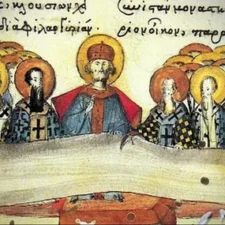A few months ago, I read Rocco Boni’s Quantum Christian Realism, a fascinating book that explores how quantum physics- especially its discoveries about indeterminacy and immateriality- can help ground key Christian doctrines like free will, providence, and soul–body hylomorphism/ dualism at the most fundamental layer of reality. A couple of years ago, I came across a video by Inspiring Philosophy titled “Christian Panentheism,” in which he enthusiastically championed what he called Palamite Panentheism: the Eastern Orthodox teaching that God is both beyond and actively present within creation through His divine energies. While these perspectives might initially sound like New Age speculation, I’ve found they… Continue reading
It’s a scene every moviegoer remembers: Vizzini, convinced of his own brilliance, keeps shouting “Inconceivable!” every time events defy his expectations. Finally, Inigo Montoya turns to him and delivers the perfect rebuke: “You keep using that word. I do not think it means what you think it means.” The same could be said of much modern Orthodox talk about economia and akribeia. These are ancient theological terms with precise meanings shaped by the canons and the Fathers, yet today they’re flung about as if akribeia meant harshness and economia meant leniency. But that’s not what they mean, and confusing them has led to deep distortions… Continue reading
Many well-meaning Orthodox Christians today, eager to preserve the purity of the Church, have revived a rigorist approach to baptism and the reception of converts, advocating for universal rebaptism and denying the validity of any baptism performed outside visible Orthodox boundaries. While this impulse comes from genuine zeal for the faith, it constitutes the resurrection of an error repeatedly confronted and rejected by the Orthodox Catholic consensus. Drawing on selective patristic quotations and novel interpretations of ancient concepts, modern rigorists often misunderstand both the history and the tradition of the Church on this issue.
The Historical and Patristic Foundations
The roots of the current controversy… Continue reading
Wrestling with the “Genocide Commands” of the Old Testament: Giants, Rhetoric, and Spiritual Battle
For readers troubled by the Old Testament’s stories of conquest and destruction, there are few issues more challenging than the so-called “genocide commands.” Did God really endorse wholesale slaughter? Recent theological and biblical scholarship – especially through the work of Michael Heiser, Frs. Stephen De Young and Andrew Stephen Damick at the Lord of Spirits podcast, and Dr. Paul Copan, offer a richer, more faithful explanation, anchored in ancient worldviews, spiritual realities, and textual nuances.
Ancient War Rhetoric: When “Total” Didn’t Mean Total
Ancient Near Eastern records are full of “total… Continue reading
Introduction
Two men sit across a wooden table in a dimly lit library. Andrew, an Orthodox Christian, leans forward with a well-worn Septuagint and patristic writings at his elbow. Martin, an earnest evangelical, grips his KJV Bible. Their debate centers on authority: Scripture alone versus Scripture and Holy Tradition. Andrew argues that sola scriptura is a Reformation-era innovation, while Martin insists it is biblical. Let us listen as history, Scripture, and logic collide…
________________________________________
Martin: “Brother, the Bible is clear: All scripture is given by inspiration of God (2 Timothy 3:16, KJV). We don’t need traditions! Christ rebuked the Pharisees for elevating their traditions over… Continue reading
I recently listened to a homily on the Sunday of the Myrrh-Bearing Women by Fr. Peter Heers. It started off well enough and was delivered with eloquence, it promised to be a good sermon. But, at the halfway point, it took a turn into eisegesis — working one’s favorite issues into a Gospel pericope that had nothing to do with the passage prescribed for the Sunday. Because it delves into issues which trouble the American Orthodox churches, I felt a need to offer a generalized critique of Fr. Peter Heers’ homily from a traditional, but not rigorist, Orthodox perspective, inspired by patristic approaches to the… Continue reading
The stories of Enoch and Elijah have fascinated Christians for centuries. Both men, according to Scripture, were taken from this world in extraordinary ways—Enoch “walked with God, and was not, for God took him” (Genesis 5:24), and Elijah was swept up in a fiery chariot (2 Kings 2:11). Many wonder: did they escape death and enter Heaven before Christ? And what does their fate mean for the rest of us?
In Orthodox tradition, these questions are not just historical curiosities. They touch on the very heart of our faith: the uniqueness of Christ’s victory over death, the meaning of resurrection, and the hope that awaits… Continue reading
A Morning Spiritual Strategy: Preparing for Daily Temptations
The morning is a sacred time for Orthodox Christians, a moment to dedicate the day to God and prepare spiritually for the challenges ahead. The Church Fathers teach us that vigilance at dawn is essential for spiritual warfare, as the mind is most receptive to divine grace when unburdened by worldly distractions. As Lorenzo Scupoli writes in Unseen Warfare:
“Fight daily with great determination. Do not let the weakness of your nature be an excuse. If your strength fails you, ask more from God. He will not refuse your request. Consider this—if the fury of your… Continue reading
The question of whether guardian angels are assigned at birth or baptism occupies a significant place in Orthodox Christian theology, reflecting broader themes of divine providence, human dignity, and sacramental grace. Two primary perspectives emerge: one emphasizing angelic guardianship as inherent to human nature from the moment of birth, and the other linking it to the transformative grace of baptism. The former underscores the intrinsic worth of every person as an image-bearer of God, while the latter highlights the sacramental renewal of that image through incorporation into the Body of Christ. Both traditions coexist within the Church’s understanding of God’s loving care, inviting pious reflection… Continue reading
The Importance of Daily Examination of Conscience
The Church Fathers emphasize the necessity of a daily examination of conscience as a powerful tool for spiritual growth. St. Paul commands Christians to examine themselves before receiving Holy Communion, warning that unworthy reception leads to judgment (1 Corinthians 11:28–31). Early monastic figures like St. Anthony, St. Augustine, and St. Bernard practiced this discipline nightly, reflecting on their actions to grow in virtue and avoid sin.
Before confession, self-examination intensifies contrition and prepares the soul for repentance. By identifying sins committed since the last confession, penitents can approach the sacrament with humility and clarity. Regular self-reflection not only… Continue reading
The Fulfillment of the Law in Christ: An Orthodox Christian Perspective
A comment on social media recently caught my attention: “Christ said He didn’t come to abolish the Law, but He totally did abolish (fulfill) the Law, and there is no remnant of the Law left, clearly.” This statement reflects a common misunderstanding of Christ’s relationship to the Law and its ongoing significance within Christianity. From an Orthodox Christian perspective, this issue is far more nuanced and profound. Rather than being abolished, the Law has been fulfilled in Christ and transformed into its mature, spiritual reality within the life of the Church.
The Law as… Continue reading
Introduction to St. John of the Ladder and His Work
St. John of the Ladder, a prominent figure in Orthodox Christian spirituality, is best known for his profound work, The Ladder of Divine Ascent. Born in the early 6th century, he became the abbot of the monasteries on Mount Sinai and dedicated his life to asceticism and spiritual guidance. His feast day, celebrated on the fourth Sunday of Lent, invites the faithful to reflect on the teachings encapsulated in his iconic text, which serves as a spiritual roadmap to achieving union with God.
The Ladder of Divine Ascent has exerted a significant influence on Orthodox… Continue reading
I decided to do a review of the Book of Romans during the second half of Lent in anticipation of the resumption of teaching Bible study classes in my parish after Pascha.
This morning’s review brought me to chapter 3 of Romans and a passage that has had a lot of traction in the West since the Reformation:
“we previously warned both Jews and Greeks that they are all under sin. 10 As it is written,
There is no one righteous; no, not one.
11 There is no one who understands.
12 There is no one who seeks God.
They have all turned aside.
They… Continue reading
One of the most complex and frequently debated questions in Orthodox ecclesiology concerns the recognition of sacraments performed outside the canonical boundaries of the Orthodox Church. While there is a hardline rigorist strain in contemporary discussions that attempts to present the practice of baptizing virtually all converts as THE historic Orthodox tradition, historical evidence reveals a more nuanced approach in both the Greek, and particularly within the Russian Orthodox tradition.
Early Church Foundations: The Baptismal Controversies That Influenced the Creed’s Statement About “One Baptism”
Whether heterodox baptisms performed in water in the name of the Trinity should be accepted first came up in the controversy… Continue reading
A lot of ink has been spilled among Western Christians in the debate concerning Faith vs. Works. What place do works, if any, have in our salvation?
From the Protestant “faith alone” side, it is insisted that works have nothing to do at all with our salvation, we are saved solely by believing in Christ apart from how we live. One of their primary proof texts is, “For by grace are ye saved through faith; and that not of yourselves: it is the gift of God: Not of works, lest any man should boast.” (Eph. 2:8-9)
From the Roman Catholic side, it has often been… Continue reading














